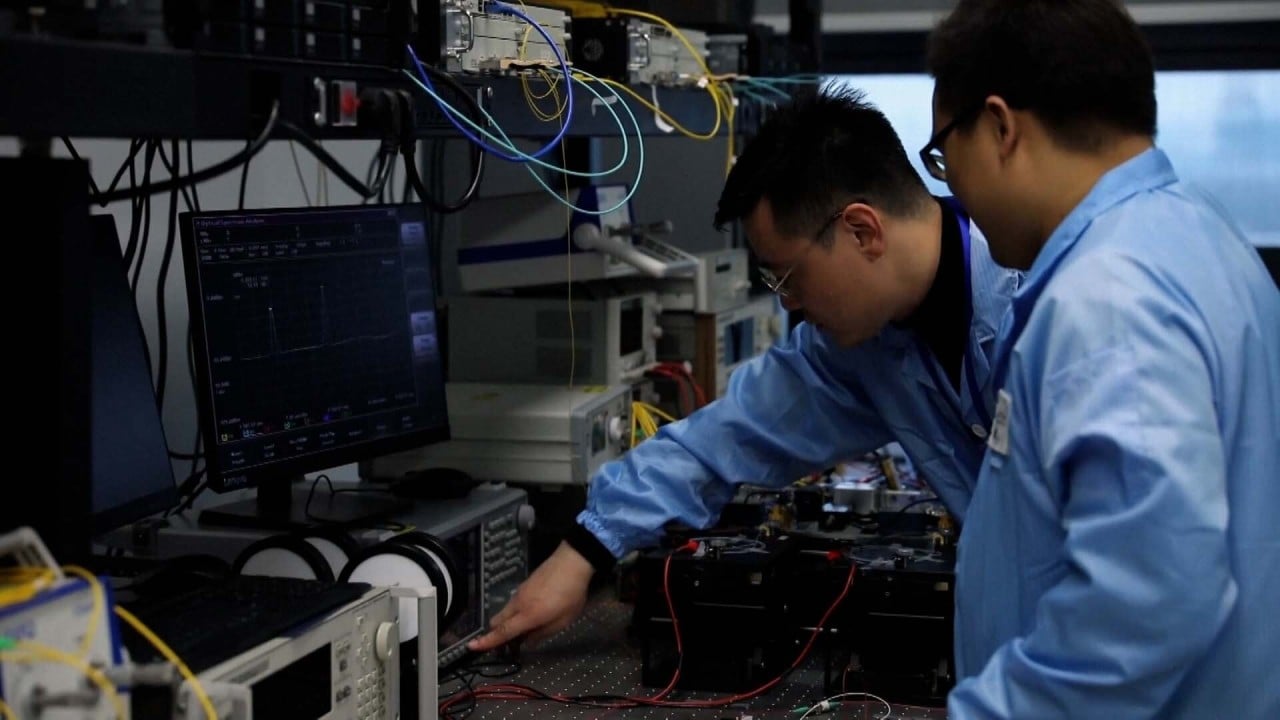
China’s taxpayers on edge as Beijing tightens oversight with big data and artificial intelligence
- China’s Golden Tax IV system will harness big data and artificial intelligence to form a web of information on taxpayers
- Beijing has vowed to clamp down on tax evasion in 2022 and tighter scrutiny has small firms and the wealthy on edge
Anxiety is spreading across China’s business community as authorities gear up to introduce a powerful new tax surveillance system that some have likened to a “giant X-ray machine”, capable of hoovering up huge amounts of personal and financial data.
In a bid to tighten supervision, China is proceeding with the construction of the Golden Tax IV system, under which company data, as well information from owners, executives, banks and various market regulators will all be connected and accessible for tax authorities to scrutinise.
“We’ve completed the design and come up with strategies and approaches to push ahead with Golden Tax IV,” said Wang Jun, head of the State Taxation Administration, at the annual tax work meeting last month.
“By upgrading the system, we’ll transition from ‘managing tax through invoices’ to ‘managing tax through big data and the cloud’.
“It’s a taxation innovation and can be used for reference by other countries.”
China vows ‘no forgiveness’ for tax cheats in ‘common prosperity’ drive
Launched in the 1990s, the first iteration of China’s Golden Tax system was an e-invoicing initiative for value-added tax (VAT). The current version, the Golden Tax III, integrates national and local tax data, while the fourth phase will monitor business activities in unprecedented detail.
“It will empower tax authorities to inspect not only invoices, but also enterprises’ business, capital, personnel and other data. This will make it easier for tax authorities to detect corporate tax evasion,” Joey Zhang, an analyst with consultancy Dezan Shira & Associates, wrote in a report last month.
China is determined to build a smart tax system powered by big data, the cloud and [artificial intelligence]
“Eventually, through information sharing and big data analysis, the tax bureau may be able to obtain an accurate data portrait of every enterprise and individual taxpayer.
Zhang added the overhaul will “undoubtedly bring new challenges” to businesses operating in China.
China has not announced the launch date for the upgraded system, though tax analysts widely expect it to be introduced this year.
Already, the prospect of tighter tax scrutiny has people on edge, from small business owners to lawyers and the wealthy.
“Many entrepreneurs refer to the new system as a giant X-ray machine,” said Zeng Liaoyuan, an associate professor of information and communication engineering at the University of Electronic Science and Technology of China in Chengdu, Sichuan province.
“I think the Chinese government has the technological prowess to obtain all data they need from government departments and social media.
“However, to what extent the authorities will tap into it also depends on political and social considerations. It’s not just a taxation matter. They must consider the impact because many companies are struggling for survival amid the pandemic.”
How does China’s tax system work for expats?
Still, the government’s expanded tax powers are adding to concerns among SMEs, who are already agitated by greater scrutiny from banks forced to comply with new requirements under Golden Tax IV.
“We SME manufacturers are tired of travelling to and from the bank these days because our bank accounts are frozen,” said Bob Yao, an industrial automation manufacturer.
“Most of us SME owners have been collecting payments through our personal bank cards for years, for domestic and overseas orders. Recently, banks keep asking us to explain the reasonableness of each flow, even 20,000 or 30,000 yuan traced back three or four years, and the bank will pass this information to the local tax office if we cannot give detailed explanations.”
John Pan, who sells jade via social media and mobile payment app WeChat, said merchants like him doing business and marketing online are worried.
“I usually send pictures of jadeite and jade on WeChat Moments to attract customers, and use WeChat Pay or Alipay to collect money, and then express to deliver the goods,” he said.
“Almost all customers do not require me to invoice them for purchases, nor do I invoice my suppliers.”
Pan often shares screenshots of customers’ electronic payments to attract more orders, but he is now “afraid tax authorities will investigate my WeChat account”.
I am very concerned about the possible impact of the Golden Tax IV project on my industry
“But I also understand everyone’s digital information is now under the control of the authorities,” he said.
China’s wealthy are also bracing for bigger tax bills this year, anxiety that has been amplified by Xi’s “common prosperity” campaign.
“I am very concerned about the possible impact of the Golden Tax IV project on my industry,” said Alice Luo, a Guangdong-based lawyer. “If there is a massive overhaul of the legal profession, it will mean that most Chinese lawyers will have to re-estimate their actual income, which will definitely be far less than before.”
In the Chinese legal profession, 15-25 per cent of a lawyer’s fee for each case is usually handed over to the law firm as commission, then expenses are deducted, and the remaining 50-60 per cent is the lawyer’s income, Luo said.
“However, many lawyers will actually abuse various invoices to offset the cost of handling cases, so as to minimise the payment of high personal income tax,” she said.
Faced with the Golden Tax IV project, many upper class Chinese are looking into immigration or foreign citizenship to take advantage of more relaxed tax rules for assets and wealth inheritance overseas.
“Beijing has clearly increased efforts to regulate high-income earners as an important part of the common prosperity strategy,” said Echo Liang, an agent helping wealthy Chinese emigrate and invest overseas.
“If you are in a high-income group, it is inevitable that you will have this anxiety.”
How age-old prejudice is fuelling worker shortages in China’s factories
She said a growing number of clients have been consulting her about ways to create offshore accounts and incorporate overseas.
“Frankly, it’s very difficult and far more expensive to do it now than it was two or three years ago.”
Over the next two years, demand for wealth management and tax planning to protect assets will surge in China, she said.
But the big data analysis central to the new tax system will make it difficult for any liabilities to slip through, Liang added.




